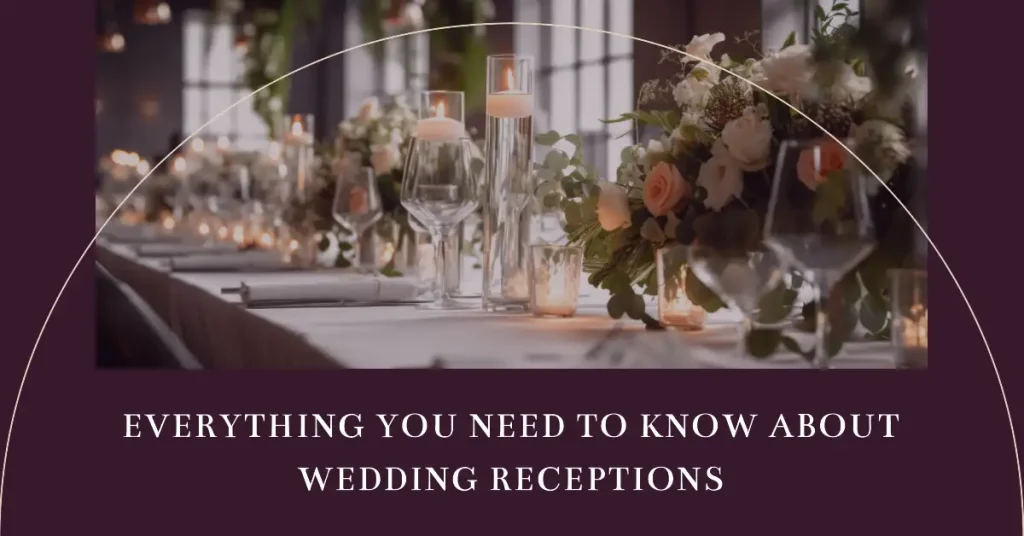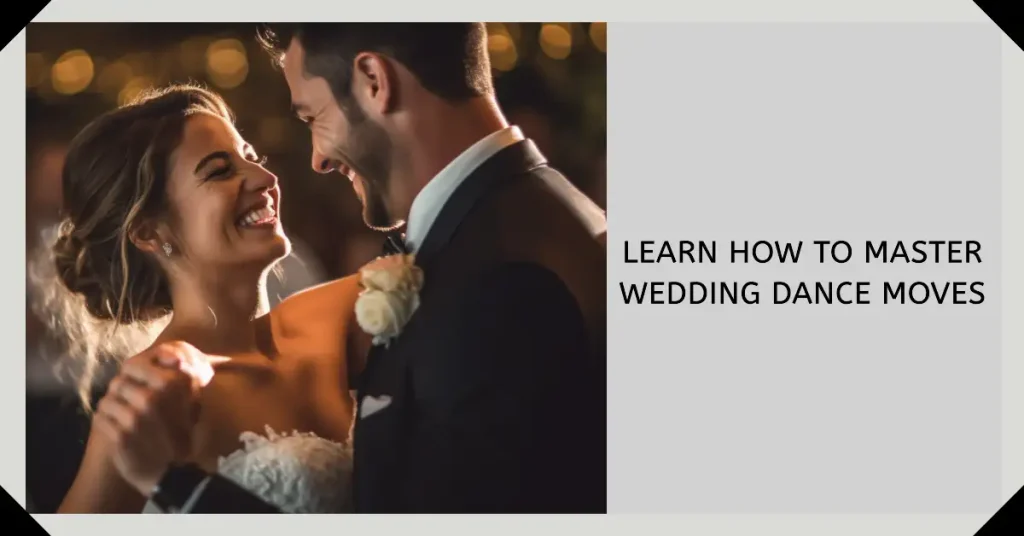Table of Contents
A wedding reception is a festive occasion following a wedding ceremony where the newlyweds celebrate with family and friends through food, drinks, music, and dancing.
A wedding reception is a joyous celebration that follows the wedding ceremony, where family and friends come together to share their happiness for the newlyweds. It’s an essential part of the big day, as it allows everyone to relax, enjoy good food, and create lasting memories.
The History And Cultural Significance Of Wedding Receptions
Wedding receptions are more than just a party after the ceremony. They have a rich history and cultural significance that has evolved over time. Across various cultures and time periods, wedding receptions have served as a way to celebrate the union of two people and bring together loved ones to share in the joy of the occasion.
- Carter, Lisa (Author)
- English (Publication Language)
- 107 Pages - 04/06/2024 (Publication Date) - Independently published (Publisher)
In ancient times, wedding celebrations were often marked by elaborate feasts that could last for days. These feasts served not only as a way to celebrate the newlyweds but also as a way to showcase the wealth and social status of the families involved.
As time passed and traditions changed, wedding receptions evolved to include more modern elements. Today, receptions often include lively music, dancing, and elaborate decorations. They serve as a way for couples to express their personal style and preferences and create a memorable experience for their guests.
Despite these changes, the core purpose of wedding receptions has remained the same: to bring together loved ones in celebration. They offer a chance for family and friends to come together, reconnect, and make new memories that will last a lifetime.
In addition to celebrating love and bringing people together, wedding receptions also have cultural significance. In many cultures, specific traditions and customs are incorporated into the celebration. For example, in some Indian weddings, the reception is marked by a ritual called the “saptapadi,” where the bride and groom take seven steps together and make seven promises to each other.
Elements Of A Wedding Reception
When it comes to planning a wedding reception, there are many elements to consider to ensure a memorable and enjoyable event for you and your guests. From the venue to the entertainment, here are some key elements of a wedding reception:
Venue Selection and Decoration
Venue selection and decoration are key elements of any wedding reception, as they set the tone and create the atmosphere for the event. Choosing the right venue is essential and should be done carefully, taking into account factors such as the size of your guest list, location, and preferred style.
Start by considering the number of guests you will be inviting to your reception. You’ll want to make sure the venue is large enough to accommodate everyone comfortably. Additionally, think about the location of the venue and whether it’s accessible for your guests. You may also want to think about the time of year and the weather conditions for the location.
Once you’ve chosen a venue, you can get creative with decorations that reflect your personalities and the theme of your wedding. Consider using your wedding colors or incorporating elements that showcase your interests or hobbies. You can use flowers, lighting, centerpieces, and other decorations to create a beautiful and unique atmosphere that will impress your guests.
It’s important to work with the venue to ensure that the decorations you have in mind are feasible and within your budget. Many venues have restrictions on what you can and can’t do, so you need to have a clear understanding of their policies before finalizing your plans.

Food and Beverages
Food and beverages are a crucial part of any wedding reception. It’s important to carefully consider the catering options to ensure that your guests are satisfied and enjoy the meal.
Consider Your Guests’ Dietary Needs and Preferences
When creating the menu, it’s important to keep in mind any dietary restrictions or preferences that your guests may have. This could include vegan or vegetarian options, gluten-free options, or accommodations for allergies. You want to make sure that everyone can enjoy the meal, regardless of their dietary needs.
Choose a Catering Style
There are many catering styles to choose from, including buffets, plated dinners, and family-style meals. Each option has its pros and cons, so it’s important to consider which will work best for your guests and budget.
Don’t Forget About the Wedding Cake
No wedding reception is complete without a beautiful and delicious wedding cake. You can choose a design that complements your wedding theme and adds a personal touch to the reception.
Offer a Range of Drinks
It’s important to offer a range of drinks to quench your guests’ thirst. This includes both alcoholic and non-alcoholic options. You may also want to consider having a signature cocktail that reflects your personal style or wedding theme.
Entertainment
Entertainment is also an important part of the wedding reception. Keeping your guests engaged and entertained throughout the evening will ensure that everyone has a great time.
Music and Dancing
Music is often the centerpiece of any wedding reception, and hiring a band or DJ can help keep the party going all night long. Make sure to choose a playlist that includes a variety of music genres and songs that will get everyone on the dance floor. You can also consider hiring a live band to add a unique touch to the reception.
Games and Interactive Experiences
Incorporating games or interactive experiences can add a fun and unique element to your reception. You can set up photo booths, lawn games, or interactive installations that encourage your guests to get involved and have fun. Consider your guests’ interests and personalities when choosing these activities to ensure that they are a hit.
Other Entertainment Options
There are plenty of other entertainment options to consider as well. You could hire a magician, caricature artist, or a dance instructor to teach your guests a new dance. The possibilities are endless, and you can get as creative as you like.
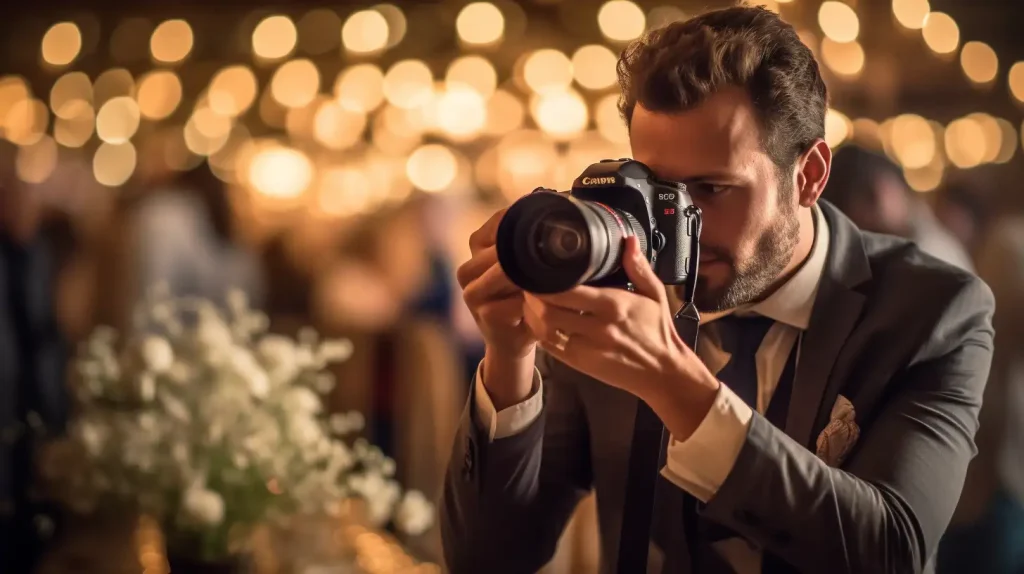
Photography and Videography
Photography and videography are essential when it comes to wedding receptions. These are the memories that you and your guests will look back on for years to come, so it’s important to choose a photographer and/or videographer who can capture your special moments in a way that reflects your vision and style.
Choose a Style
There are many photography and videography styles to choose from, including traditional, candid, and artistic. Think about the style that best reflects your personalities and the overall theme of your wedding and look for a photographer and/or videographer who specializes in that style.
Check Their Portfolio
When considering potential photographers and videographers, it’s important to review their portfolio to ensure that their work aligns with your vision. Look for examples of their previous work to see if their style matches your preferences and if they have experience shooting in your chosen venue.
Communicate Your Vision
It’s essential to communicate your vision and preferences to your photographer and/or videographer. This includes any must-have shots, preferred angles or lighting, and any specific moments you want captured. Make sure to discuss these details before the wedding day so that everyone is on the same page.
Review the Contract
Before hiring a photographer and/or videographer, make sure to review the contract carefully. This should include details such as the number of hours of coverage, the number of photos or videos you’ll receive, and any additional fees or expenses. Make sure that everything is clear and agreed upon before signing the contract.
Wedding Reception Timelines
Creating a wedding reception timeline is essential to ensure that the events flow smoothly and that you have enough time to enjoy every moment of your special day.
Suggested Order of Events
A typical wedding reception timeline involves guests arriving and enjoying cocktails before proceeding to dinner and dancing. You can add special moments such as speeches, cake cutting, and the first dance to add a personal touch to your reception.
Speeches and Toasts
Traditionally, the father of the bride, best man, and maid of honor give speeches during the reception. However, you can include other loved ones who want to share their well-wishes as well. Make sure to allocate enough time for each speech and keep them brief to ensure that the event stays on schedule.
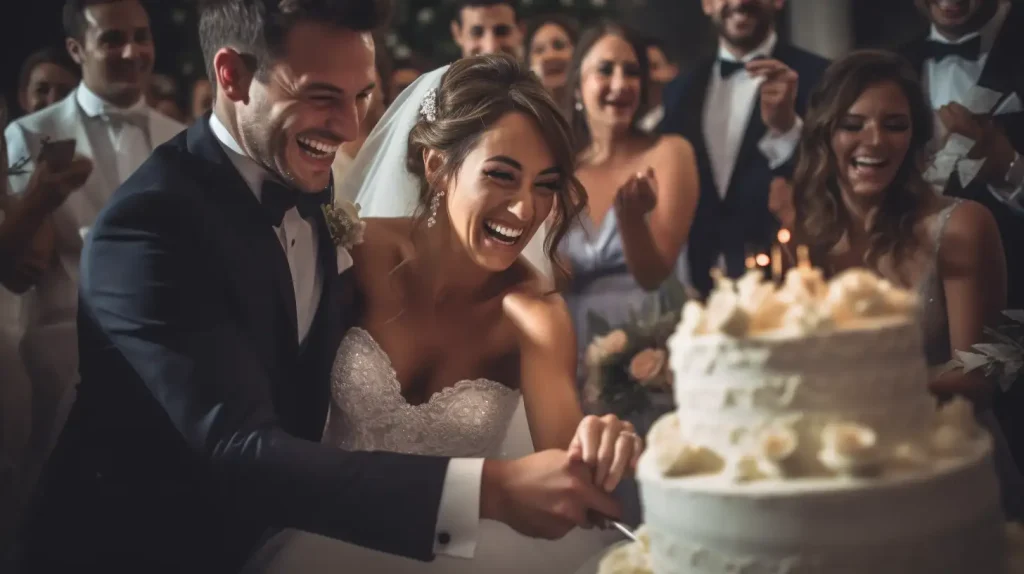
Cake Cutting and First Dance
These iconic moments symbolize unity and partnership and are often included in the wedding reception timeline. Schedule them early in the evening to set a romantic tone for the rest of the night. It’s important to coordinate with your photographer and videographer to ensure that they capture these special moments.
Dinner and Dancing
Once the special moments have been completed, it’s time for the guests to enjoy dinner and dancing. The duration of these events will depend on your preferences and the size of your guest list. Make sure to schedule enough time for everyone to enjoy the meal and get on the dance floor.
Etiquette and Customs
Etiquette and customs are an important aspect of any wedding reception.
Guest Invitations and RSVPs
Guest invitations and RSVPs are a crucial part of any wedding reception.
Send Invitations Well in Advance
It’s important to send out invitations well in advance of the wedding reception, typically 6-8 weeks before the event. This gives guests enough time to make travel arrangements and plan accordingly. Make sure to include all the relevant information, such as the date, time, location, and dress code, to ensure that guests have all the information they need to attend.
Request RSVPs
Requesting RSVPs is important to ensure an accurate headcount for your reception. Make sure to include a deadline for RSVPs and provide multiple ways for guests to respond, such as an RSVP card or an online RSVP option. This makes it easy for guests to respond and gives you a better idea of how many guests to expect.
Include Important Details
Make sure to include all the important details on your invitations, such as the ceremony and reception times, the venue address, and any special instructions or requirements. This ensures that guests have all the information they need to attend and can plan accordingly.
Consider Adding Personal Touches
Adding personal touches to your invitations, such as custom designs or personalized messages, can make them even more special and memorable. You can also consider offering different types of invitations, such as traditional paper invitations or digital invitations, to suit your guests’ preferences.
Seating Arrangements
Creating a seating plan for your wedding reception is an important aspect of the event.
Encourage Conversation and Mingling
When creating your seating plan, consider how you can encourage conversation and mingling among your guests. Seat guests with similar interests and backgrounds together and consider factors such as family relationships and age groups. You can also consider mixing up the seating plan throughout the reception to encourage guests to meet new people and make new connections.
Offer a Mix of Seating Styles
Offering a mix of seating styles, such as round tables or long banquet-style tables, can add variety to the reception and create a more interesting and dynamic atmosphere. You can also consider offering lounge seating areas or other comfortable seating options for guests to relax and socialize.
Consider Special Accommodations
When creating your seating plan, consider any special accommodations that may be needed for your guests. For example, you may need to reserve seats for elderly guests or guests with disabilities to ensure their comfort and safety. You can also consider offering a children’s table or separate seating area for families with young children.
Communicate the Seating Plan
Make sure to communicate the seating plan to your guests in advance, either through a seating chart or by indicating their table assignments on their place cards. This allows guests to find their seats easily and helps to create a smooth and organized reception.
Thank You Notes and Favors
Showing your appreciation to your guests is an important part of any wedding reception.
Thank You Notes
Sending personalized thank you notes is a thoughtful way to express your appreciation and thank guests for attending and celebrating with you. Make sure to mention specific details about the wedding reception or any gifts that guests may have given, as this shows that you truly appreciate their presence and thoughtfulness. You can also include a small photo from the wedding reception or a personalized message to make the thank you notes even more special.
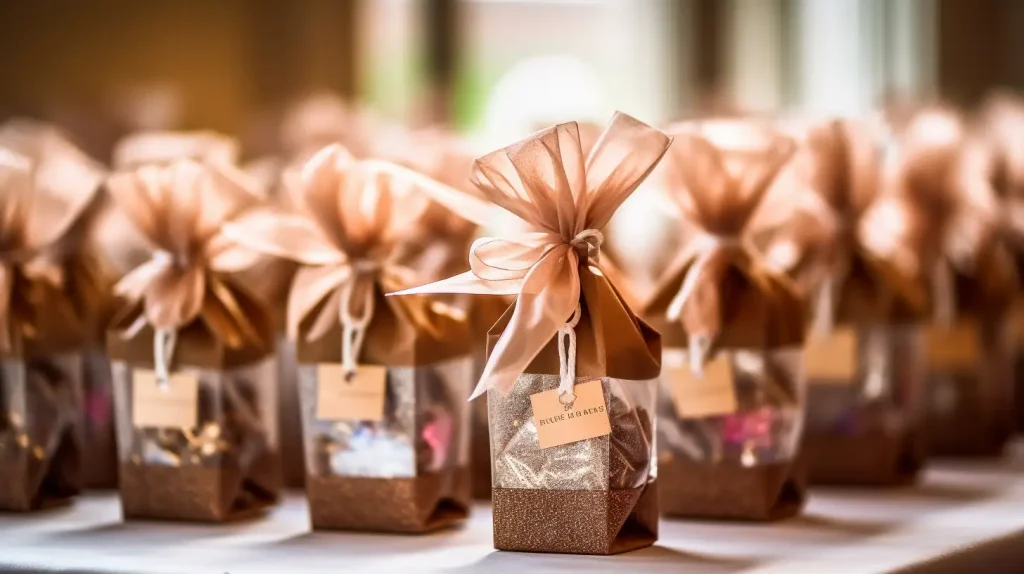
Wedding Favors
Offering wedding favors is another way to show your gratitude and thank guests for attending your wedding reception. Consider personalized gifts or small tokens of appreciation that reflect your personalities and the theme of your wedding. For example, you could offer custom chocolates or cookies, personalized candles, or small potted plants. Make sure to include a personalized note or tag with the favors to remind guests of your special day.
Timing
Make sure to send thank you notes and distribute wedding favors in a timely manner after the wedding reception. Aim to send thank you notes within a month of the reception and distribute wedding favors either during the reception or within a few days afterward. This shows that you appreciate your guests and are grateful for their support and presence at your special event.
Other Etiquette Considerations
Other etiquette considerations are an important aspect of any wedding reception.
Dress Code
Make sure to communicate the dress code to your guests in advance, so they know what to wear to your wedding reception. If you have a specific dress code in mind, such as black-tie or cocktail attire, make sure to communicate this clearly on your invitations or wedding website. This will help guests feel more comfortable and confident in their attire and ensure a cohesive and elegant look for your reception.
Gift Giving
If you are registered for gifts or have specific gift preferences, make sure to communicate this to your guests in advance. You can include this information on your wedding website or on a separate information card included with your invitations. You may also want to consider offering a registry or gift list to make it easier for guests to select a gift that you will truly appreciate.
Speeches
Speeches are an important part of many wedding receptions, and it’s important to communicate any expectations or requirements to your speakers in advance. Make sure to provide a clear timeline and instructions for how long each speech should be and what topics are appropriate. You may also want to consider providing a microphone or other equipment to ensure that speeches are easily heard by all guests.
Other Considerations
There are many other etiquette considerations to keep in mind when planning your wedding reception, such as seating arrangements, alcohol consumption, and social media sharing. Make sure to communicate any important information or expectations to your guests in advance and provide clear instructions to ensure a smooth and enjoyable experience for everyone involved.

Tips for Personalizing Your Wedding Reception
Personalizing your wedding reception is a great way to make your special day even more memorable and meaningful.
Unique Themes and Color Schemes
Here are some more ideas to help you choose a unique theme or color scheme for your wedding reception:
Reflect Your Personal Style and Story
Your wedding reception is a reflection of you and your partner, so choosing a theme or color scheme that reflects your personal style and story is a great way to make it unique. Consider your favorite colors, hobbies, and interests, and find ways to incorporate them into your reception. This will make your wedding reception more personal and meaningful.
Choose a Theme
Choosing a theme for your wedding reception is a great way to add personality and creativity to your event. You could choose a theme like a rustic, bohemian, or vintage, or something that reflects your shared interests, like travel or music. Your theme could also be based on your favorite season or holiday, like a winter wonderland or a Halloween-inspired reception.
Pick a Color Scheme
Choosing a color scheme is another way to add personality and style to your wedding reception. You could choose colors that reflect the season or mood of your wedding, like warm, earthy tones for a fall wedding or cool, pastel colors for a spring wedding. You could also choose colors that have special meaning to you, like the colors of your favorite sports team or a meaningful place you’ve traveled to.
Incorporate Unique Decorations
Once you’ve chosen a theme or color scheme, you can incorporate unique decorations to bring your vision to life. For example, if you’ve chosen a rustic theme, you could use natural materials like wood, burlap, and flowers to decorate your reception. If you’ve chosen a vintage theme, you could incorporate antique decorations and vintage-inspired details.
DIY Decorations and Personal Touches
Incorporating DIY decorations and personal touches is a great way to make your wedding reception feel uniquely yours. Here are some ideas to help you get started:
Create Your Own Decorations
One way to add a personal touch to your wedding reception is by creating your own decorations. You could make your own centerpieces using flowers, candles, or other materials, or create unique place cards using calligraphy or hand-lettering. You could also make your own favors, like homemade jam or soap, to give to your guests as a special thank you.
Add Personal Touches
Adding personal touches is another way to make your wedding reception feel unique and special. You could display family photos or heirlooms as part of your decor, or include personal mementos, like a special book or piece of art, on your reception tables. You could also incorporate elements of your shared interests or hobbies, like incorporating your favorite sports team or musical genre into your reception.
Showcase Your Creativity and Personality
Incorporating DIY decorations and personal touches allows you to showcase your creativity and personality. By creating your own decorations and incorporating personal touches, you can add a unique and meaningful touch to your wedding reception. Your guests will appreciate the effort you put into making your reception special, and you’ll have a one-of-a-kind wedding reception that reflects your style and personality.
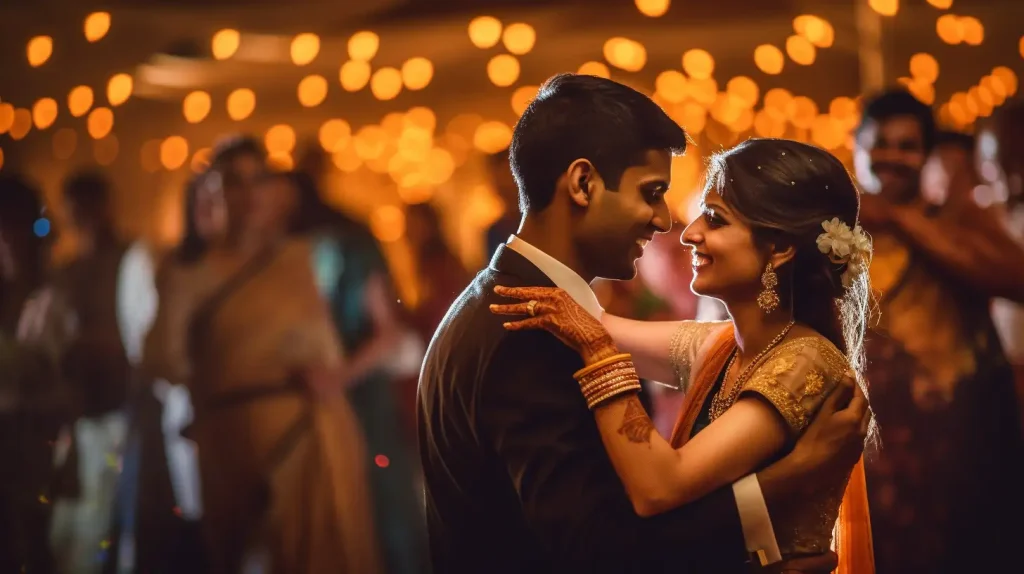
Incorporating Cultural or Family Traditions
Incorporating cultural or family traditions is a wonderful way to make your wedding reception feel more personal and meaningful.
Traditional Dances or Music
Consider incorporating traditional dances or music from your culture or family traditions into your wedding reception. This could include a traditional dance, like a Jewish Horah or a Latin American salsa, or playing traditional music from your culture throughout the reception. This not only adds a personal touch to your reception, but it also allows you to share your cultural heritage with your guests.
Family Recipes
Incorporating family recipes into your reception menu is another way to add a personal touch and honor your heritage. Consider adding a special family dish to the menu or creating a signature cocktail that is inspired by your culture or family traditions. This is a great way to share your heritage with your guests and introduce them to new flavors and traditions.
Cultural Decorations
You could also incorporate cultural decorations into your wedding reception to add a personal touch. This could include traditional textiles, artwork, or decorative elements from your culture. You could also consider incorporating traditional colors or patterns into your reception decor to add a unique touch.
Traditional Clothing
Wearing traditional clothing or incorporating traditional elements into your wedding attire is another way to honor your heritage. This could include wearing a traditional wedding gown from your culture or incorporating traditional accessories or jewelry into your wedding attire.
Budgeting and Planning Considerations
Establishing a Budget
Establishing a realistic budget is an important first step in planning your wedding reception.
Determine your overall budget
The first step in creating a wedding reception budget is to determine how much you can realistically afford to spend. This will help you to set realistic expectations for your reception and avoid overspending.
Prioritize expenses
Make a list of all the necessary expenses for your wedding reception, such as venue fees, catering, entertainment, and decor. Once you have a list of expenses, prioritize them based on what is most important to you.
Research costs
Do your research to find out the average costs for the items on your list. This will help you to create a more accurate budget.
Allocate funds
Once you have a list of expenses and their associated costs, allocate funds accordingly. Consider what is most important to you and allocate more funds to those items. Be sure to leave room in your budget for unexpected expenses.
Working with Vendors and Negotiating Contracts
Here are some tips for working with vendors and negotiating contracts for your wedding reception:
Do your research
Before choosing a vendor, do your research to find out more about their services and reputation. Look for reviews and ratings online and ask for recommendations from friends and family.
Communicate your needs
Be clear about your needs and budget when speaking with vendors. This will help them to understand what you’re looking for and to provide you with options that fit within your means.
Negotiate contracts
Don’t be afraid to negotiate contracts with vendors. Ask for discounts or package deals and be willing to negotiate terms that work for both parties. Many vendors are willing to work with you to find a solution that fits your budget.
Get everything in writing
Make sure that all agreements with vendors are in writing, including any discounts or special offers. This will help to avoid misunderstandings and ensure that everyone is on the same page.
Be respectful and professional
Remember that vendors are professionals who are providing a service for your wedding reception. Be respectful and professional in your interactions with them and try to build a positive relationship based on mutual trust and respect.
Sticking to Your Budget
The following tips should help you stick to your budget for your wedding reception:
Keep track of your expenses
One of the most important things you can do to stick to your budget is to keep track of your expenses. Use a spreadsheet or budgeting app to record all of your expenses and update it regularly.
Make adjustments as necessary
If you find that you’re spending more than you anticipated, it may be necessary to make adjustments to your budget. Consider cutting back on non-essential items or finding more cost-effective alternatives.
Look for ways to save money
There are many ways to save money on your wedding reception, such as DIY decorations or opting for a buffet instead of a plated dinner. Look for opportunities to save money without compromising on the quality of your reception.
Consider the long-term impact
Remember that your wedding reception is just one day, and it’s important to consider the long-term impact of your spending. Don’t go into debt or compromise your financial security for the sake of one event.
Stay focused on what’s important
Finally, remember to stay focused on what’s important to you. Prioritize the elements of your reception that are most important to you, and don’t get sidetracked by non-essential items or pressure from others.
Challenges and Solutions
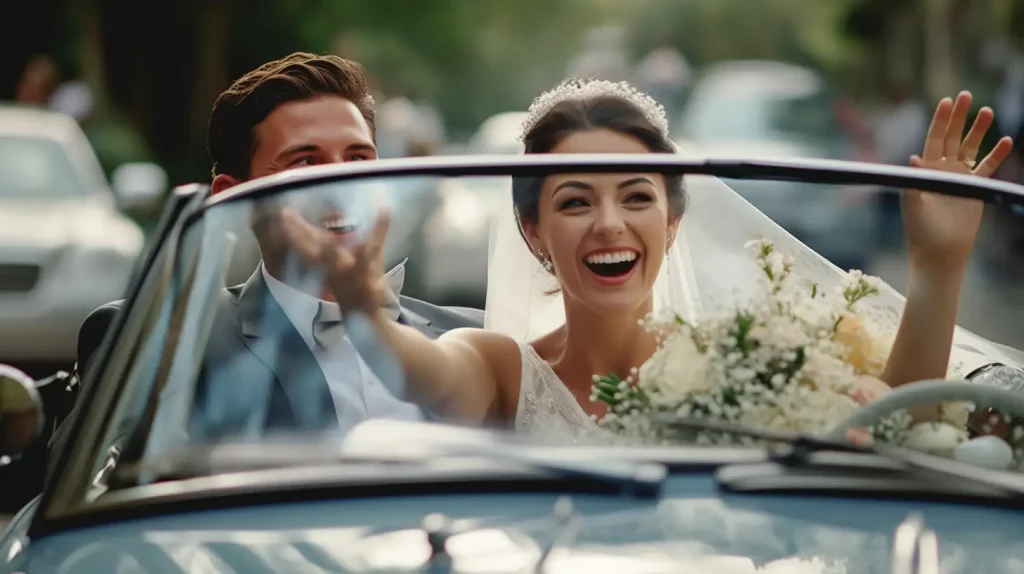
Common Issues During Wedding Receptions and How to Deal with Them
While planning can help prevent potential issues during your wedding reception, there are some common issues that can still arise despite your best efforts.
One potential issue is inclement weather, which can impact outdoor weddings or other events. If you are planning an outdoor wedding or reception, it’s important to have a backup plan in case of rain or other severe weather conditions. Consider having a tent or indoor location available in case of inclement weather.
Last-minute cancellations, such as from vendors or guests, can also occur. If there are any changes to your wedding reception plans, such as a change in location or time, be sure to communicate these changes to your guests in a timely manner. This can help minimize confusion and ensure that everyone is on the same page.
Technical difficulties, such as sound system or lighting issues, can also arise during your reception. Make sure to have a technician or someone familiar with the equipment on hand to troubleshoot any issues that may arise.
Stay Calm and be Flexible
Despite your best planning efforts, unexpected challenges may still arise during your wedding reception. It’s important to remain calm and flexible in the face of these challenges. Here are some tips for staying calm and flexible:
- It’s natural to feel disappointed or frustrated when something doesn’t go according to plan, but it’s important to keep things in perspective. Don’t let minor issues ruin your special day.
- Having a support system in place can be incredibly helpful during challenging moments. Enlist the help of trusted friends, family members, or a wedding coordinator to help troubleshoot any issues that arise.
- Remember that flexibility is key to handling unexpected challenges. Be open to alternative solutions and be willing to adapt to changing circumstances.
Prioritize
One of the keys to planning a successful wedding reception is to prioritize the most important elements. By focusing on what truly matters, you can ensure that your special day is everything you’ve dreamed of.
- Take some time to think about what matters most to you and your partner. Is it spending quality time with loved ones, having a delicious meal, or dancing the night away? Once you’ve identified your top priorities, you can focus your attention and budget accordingly.
- While every detail of your wedding reception is important, it’s important to remember that some things are more important than others. Don’t let minor issues or imperfections distract you from the big picture.
- Flexibility is key when it comes to prioritizing your wedding reception. Be open to new ideas and be willing to adapt your plans if necessary to ensure that your top priorities are met.
- At the end of the day, the most important element of your wedding reception is your love and commitment to each other. Make sure that everything you do, from the decor to the menu, reflects this core value.
What is a Wedding Reception? Conclusion
A wedding reception is an opportunity to celebrate your love and commitment with your nearest and dearest. By prioritizing what matters most to you, such as personal touches, cultural traditions, and spending time with loved ones, you can create a memorable and meaningful reception. It’s important to consider all the elements that go into planning a reception, from venue selection and decorations to food and entertainment, and to establish a realistic budget that fits your needs.
When challenges arise, remember to stay calm, be flexible, and enlist the help of those around you. With careful planning and a focus on what truly matters, your wedding reception will be an unforgettable experience for everyone involved.
FAQs
Q: How long does a wedding reception last?
A: The length of a wedding reception can vary depending on the couple’s preferences and the venue’s policies. Typically, they last between four and six hours.
Q: Who pays for the wedding reception?
A: Traditionally, the bride’s family pays for the wedding reception, but nowadays it’s common for the couple or both families to split the cost.
Q: What should I wear to a wedding reception?
A: The dress code for a wedding reception can vary depending on the couple’s preferences and the venue’s policies. Typically, it’s best to dress formally or semi-formally, but it’s always a good idea to check with the couple or venue to see what’s appropriate.
Q: Can I bring a date to a wedding reception?
A: This can depend on the couple’s preferences and the capacity of the venue. Typically, invitations will specify whether or not a guest is allowed. If the invitation doesn’t mention a guest, it’s best to assume that you are not allowed to bring one.
Q: What’s the difference between a wedding reception and a wedding ceremony?
A: The wedding ceremony is the formal exchange of vows and rings that legally binds the couple in marriage. The wedding reception is a celebration that follows the ceremony and is a social gathering that brings together the newlyweds, their families, and guests to celebrate their union.
Q: Can children attend a wedding reception?
A: This can depend on the couple’s preferences and the capacity of the venue. If the invitation doesn’t mention whether children are allowed, it’s best to check with the couple or the venue to see what their policies are.
Q: Can I bring a gift to a wedding reception?
A: Yes, it’s common to bring a gift to a wedding reception to congratulate the newlyweds. It’s best to check the couple’s registry or ask the couple or their families for gift ideas.
Q: How do I decide on a wedding reception venue?
A: When choosing a wedding reception venue, consider factors such as guest capacity, location, and your preferred style. You can also think about any unique features or amenities the venue offers, and whether they align with your vision for your reception.
You can also make sure your guests are comfortable by providing comfortable seating and ample space for mingling.
Q: Do I need to have a formal seating plan for my wedding reception?
A: While a formal seating plan is not required, it can be helpful in ensuring a smooth flow of events and encouraging conversation and mingling among guests. It also allows you to take into account any family relationships, age groups, or common interests when assigning seats.
Key Takeaways
1. Wedding receptions are joyous celebrations that follow the wedding ceremony, where family and friends come together to share happiness for the newlyweds. It’s an essential part of the big day and allows everyone to relax, enjoy good food, and create lasting memories.
2. Wedding receptions have a rich history and cultural significance, evolving over time. They have been a way to celebrate the union of two people and bring together loved ones to share in the joy of the occasion.
3. Ancient wedding receptions often involved elaborate feasts that showcased the wealth and social status of the families involved. Today, receptions include modern elements such as lively music, dancing, and elaborate decorations, allowing couples to express their personal style and preferences.
4. Key elements of a wedding reception include venue selection and decoration, games and interactive experiences, entertainment options, reviewing contracts with photographers and videographers, creating a wedding reception timeline, and including important details on invitations.
5. Other considerations for wedding receptions include seating arrangements, encouraging conversation and mingling among guests, speeches, etiquette considerations, budgeting and planning considerations, and staying calm and flexible in the face of unexpected challenges.
6. The length of a wedding reception can vary but typically lasts between four and six hours. Traditionally, the bride’s family paid for the reception, but nowadays, the cost is often split between the couple and both families.
7. The dress code for a wedding reception depends on the couple’s preferences and the venue’s policies. Guests are typically encouraged to bring a gift to congratulate the newlyweds, following the couple’s registry or asking for gift ideas.
8. When choosing a wedding reception venue, factors to consider include guest capacity, location, preferred style, unique features or amenities, and ensuring comfort for guests with seating and mingling space.
9. While not required, having a formal seating plan can be helpful in ensuring a smooth flow of events and encouraging conversation and mingling among guests.
COPYRIGHT NOTICE
Please be advised that all images, designs, and creative content on this page are the exclusive property of TheIDoGuide.com and are protected under international copyright laws. The images may not be reproduced, copied, transmitted or manipulated without the written permission of TheIDoGuide.com.
Unauthorized use, distribution, display, or creation of derivative works of any images contained on this site, is strictly prohibited and can lead to legal penalties. We actively monitor for, and enforce, our copyright interests.
If you wish to use any of our images, kindly contact us to seek permission. Respect of copyright is not merely a legal requirement but also an acknowledgement and support of the hard work and creativity that goes into producing them.
Thank you for your understanding and cooperation.
© 2023, TheIDoGuide.com. All Rights Reserved.

